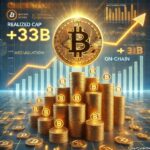
Bitcoin Surge Story Gains Momentum as Japan’s Bond Market Crumbles
Reasons to Believe
Robust editorial standards emphasizing precision, significance, and neutrality
Developed by field specialists and thoroughly vetted
Adhering to the highest benchmarks in journalism and publishing
Robust editorial standards emphasizing precision, significance, and neutrality
Morbi pretium leo et nisl aliquam mollis. Quisque arcu lorem, ultricies quis pellentesque nec, ullamcorper eu odio.
The Japanese government bond market, once celebrated for its stability, is now under pressure from its own financial calculations, creating ripple effects in global discussions about Bitcoin’s role as a reserve asset. This week, yields on thirty-year Japanese Government Bonds (JGBs) reached 3.15%, surpassing all previous highs since this term’s introduction in 1999.
This surge prompted an immediate alert from the markets newsletter, indicating that Japan’s bond market is facing a crisis. With a 3.15% yield on the 30-year bonds, Japan, once known for its low long-term rates, is now grappling with rising inflation, a changing policy landscape, and a staggering Debt-to-GDP ratio of 260%.
Liquidity, typically fragile on the long end of Tokyo’s yield curve, evaporated shortly after. Reports from New York highlighted traders’ shock, noting that for two consecutive days, Japan’s bond market had no bids, with both 30-year and 40-year JGB yields hitting record levels while the Bank of Japan maintained a stance of inaction.
Within the Japanese legislature, Prime Minister Shigeru Ishiba made a striking statement, asserting that the country’s fiscal situation is now “worse than Greece,” a shocking claim considering the past decade of deflation. This statement coincides with public debt nearing 260% of GDP as Japanese investors, who hold around $1.1 trillion in U.S. Treasuries, ponder divesting foreign assets to stabilize domestic finances.
Implications for Bitcoin
For analysts focused on Bitcoin, the implications are clear. A notable macro voice shared insights with followers, stressing that while many anticipate Yield Curve Control, Japan’s previous attempt at it has resulted in a significant bond market collapse. Institutions that relied on the Bank of Japan now find themselves burdened with considerable losses. Given this outcome, the rationale for holding sovereign debt from highly indebted nations is increasingly questioned. Central bank credibility is deteriorating rapidly, suggesting a reassessment of scarce reserve assets like Bitcoin and gold is urgent.
Dan Tapiero, founder of a major digital asset investment firm, echoed similar sentiments, pointing out a dramatic increase in Japanese long-bond yields. He raised concerns about unsustainable deficits, indicating a shift toward bullish sentiment for gold and Bitcoin.
Further reinforcing this view, when considering the global financial landscape, an expert described the situation as a game of limited safe assets against an overwhelming debt backdrop. The imbalance shows a ratio of three times more debt than GDP, with interest rates outpacing economic growth — a dire scenario that raises alarms.
Current Perspectives
The largest purchaser of U.S. debt has been Japan, but as its financial instability grows, there looms a significant possibility that Japan may offload some of these bonds to manage its own issues. This situation occurs during a pivotal year in which the U.S. will need to refinance $8 trillion; a lack of buyers could force the Fed to take action by monetizing the debt. The critical takeaway is that Bitcoin is evolving from a supplementary asset to a necessity. In an era of excessive debt, the scarcity of Bitcoin presents a compelling argument.
Prominent figures on Wall Street are also warming to this perspective. For instance, a major investment bank’s CEO expressed reluctance to invest in bonds due to excessive risks. Another thought leader highlighted that the main risk now lies not in preventing default but in the potential for currency devaluation. Observations from investment firms underscore Bitcoin’s role as a viable asset during times when governments devalue their currencies.
Bitcoin’s Market Reaction
Bitcoin’s market performance is reflecting these dynamics in real-time. The price of Bitcoin climbed to $107,322 recently, nearing its historical high from the previous halving cycle. This development doesn’t confirm Bitcoin will supplant sovereign debt but highlights a significant shift in market flows in reaction to the instability in one of the world’s largest bond markets. As Japan’s situation deteriorates, capital is increasingly directed toward assets with a finite supply. Bitcoin, designed for scarcity, fits perfectly into this emerging trend.
Whether this signifies the end of sovereign debt being viewed as entirely “risk-free” is yet to be determined. However, it is clear that the collapse of Japan’s long-term JGBs has provided Bitcoin with its most substantial macro advantage since the liquidity surge during the pandemic. The current narrative is not about stimulus but rather the realization that even economically advanced countries are facing significant financial constraints. Investors increasingly perceive bonds as risky rather than safe, while Bitcoin is being seen more as a protective asset.



















Post Comment